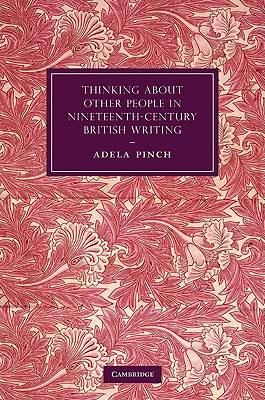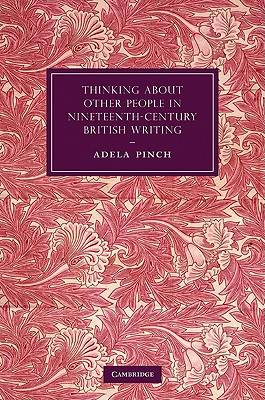
- Afhalen na 1 uur in een winkel met voorraad
- Gratis thuislevering in België vanaf € 30
- Ruim aanbod met 7 miljoen producten
- Afhalen na 1 uur in een winkel met voorraad
- Gratis thuislevering in België vanaf € 30
- Ruim aanbod met 7 miljoen producten
Zoeken
Thinking about Other People in Nineteenth-Century British Writing
Adela Pinch
€ 183,45
+ 366 punten
Uitvoering
Omschrijving
Nineteenth-century life and literature are full of strange accounts that describe the act of one person thinking about another as an ethically problematic, sometimes even a dangerously powerful thing to do. Adela Pinch explains why, when, and under what conditions it is possible, or desirable, to believe that thinking about another person could affect them. She explains why nineteenth century British writers - poets, novelists, philosophers, psychologists, devotees of the occult - were both attracted to and repulsed by radical or substantial notions of purely mental relations between persons, and why they moralized about the practice of thinking about other people in interesting ways. Working at the intersection of literary studies and philosophy, this book both sheds new light on a neglected aspect of Victorian literature and thought, and explores the consequences of, and the value placed on, this strand of thinking about thinking.
Specificaties
Betrokkenen
- Auteur(s):
- Uitgeverij:
Inhoud
- Aantal bladzijden:
- 264
- Taal:
- Engels
- Reeks:
- Reeksnummer:
- nr. 73
Eigenschappen
- Productcode (EAN):
- 9780521764643
- Verschijningsdatum:
- 8/07/2010
- Uitvoering:
- Hardcover
- Formaat:
- Ongenaaid / garenloos gebonden
- Afmetingen:
- 152 mm x 229 mm
- Gewicht:
- 517 g

Alleen bij Standaard Boekhandel
+ 366 punten op je klantenkaart van Standaard Boekhandel
Beoordelingen
We publiceren alleen reviews die voldoen aan de voorwaarden voor reviews. Bekijk onze voorwaarden voor reviews.








